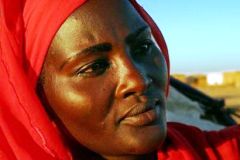FEATURE-Market days in Sudan’s Darfur draw militia raids
By Finbarr O’Reilly
EL FASHER, Sudan, Nov 16 (Reuters) – Arab militias in Sudan’s troubled Darfur region often attack African villages on market days, when the stalls are full and the looting is good.

|
|
Ekhals Abuaker, 26, at Abushouk camp near El Fasher, the capital of North Darfur state, November 13, after fleeing ethnic fighting in the town of Tawilla last week. Abushouk camp in the troubled Darfur region of western Sudan is home to more than 45,000 people driven from their villages by 22 months of fighting in Africa’s largest country, where U.N. officials are currently investigating whether genocide has occured. (Reuters). |
The town of Tawilla, a strategic transit point about 70 km (40 miles) west of El Fasher, the capital of North Darfur state, was one of the latest targets.
Ekhals Abuaker, a 26-year-old woman, was shopping for food when a gun battle broke out in the market after a dozen militiamen entered the bazaar and began looting last Tuesday.
“When the shooting started, I just ran,” said Abuaker, who fled on a battered cargo truck to El Fasher with her infant son.
At least four militiamen died in the skirmish, according to the United Nations, though villagers said they killed six of the attackers by fighting back with guns, sticks, knives and clubs.
While relatively minor, the clash is typical of Darfur’s simmering insecurity, where tit-for-tat cattle raids, attacks and revenge killings have fuelled a long-running cycle of ethnic violence that exploded into full-blown war last year.
An African Union (AU) force has been deployed to monitor an April ceasefire that has been broken repeatedly by all sides. But even when the force strength rises to more than 3,000 from 700, it faces a daunting task policing an area the size of France.
In Tawilla, residents fearful of a retaliatory militia attack scattered into the desert towards overcrowded camps where people seek a slim measure of security no longer present in their villages.
Towns are supposed to be protected by police and government troops, but Tawilla villagers from the Fur tribe say authorities side with the roaming Arab militias known as Janjaweed.
Only the rebels who roam the deserts surrounding the towns are willing to help them, villagers said.
NO-GO ZONE
“Tawilla remains a point of concern for humanitarian operations because of the proximity of the belligerent parties around the town and its importance as a (trade route),” said a U.N. security report obtained by Reuters.
The area around Tawilla has been declared a U.N. “no-go zone” because of the risk of fresh violence, the report added.
Agreements signed by the government and rebels at Sudan peace talks in the Nigerian capital Abuja last week offer a glimmer of hope, but few people in Darfur believe that distant talks will soon improve security in the vast desert region.
“Three or four rounds of negotiations have not resulted in an agreement that worked, so why should this time be any different?” asked Adam Bishara, a 47-year-old tribal leader living in a hut made of rags and sticks at a camp near El Fasher.
The AU mission in Darfur faces financial and logistical obstacles in policing the lawless area where communications are poor. Many people say the force of more than 3,000 will not be enough.
“The problem is complicated. The government alone cannot find a solution. It needs more help from the international community and the U.N.,” said Bishara, repeating a common request that the United Nations send a strong peacekeeping force.
LAWLESSNESS REIGNS
“Tribal fighting makes (bringing peace) difficult because of counter-attacks and revenge,” Jan Pronk, the top U.N. official in Sudan, said last week during a visit to Darfur.
“I am told that this is the nature of the people here. Well, if that’s the case, then the nature of people has to change,” said Pronk, condemning the lawlessness that has engulfed Darfur.
Arab nomads and African farmers have fought over scarce resources in the deserts of Africa’s largest country for decades, but in early 2003 African rebels launched a war against the government, accusing it of neglecting their region.
Fighting since then has driven some 1.5 million people from their homes and the United Nations has said about 70,000 people have died since March from violence, malnutrition and disease.
The rebels accuse the government backing the Janjaweed, Arab militias who have conducted a campaign of killing, raping and looting against African villagers in what the United States has called genocide.
Khartoum denies the accusations, calling the militiamen bandits.
Tawilla residents who fled to El Fasher said the police helped the Janjaweed to escape the town after the market crowd got the upper hand in last week’s skirmish.
“When the police came, they stood beside the Janjaweed and shot in the air to disperse the crowd,” said a Fur tribesman who fled to a camp near El Fasher and who asked that his name not be used for fear of retribution.
The man and several other villagers said the police and army promised to protect the town, but that the militia crept back the same night, looted more shops and shot two people.
“Now Tawilla has no people because we are afraid to go back,” said one former resident now at a camp in El Fasher.
